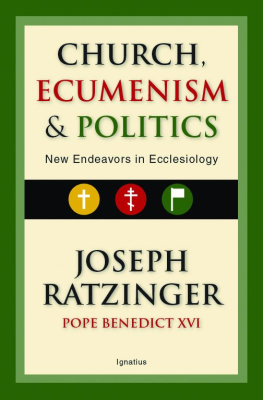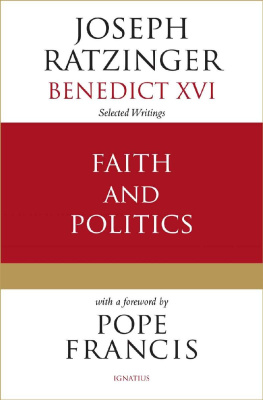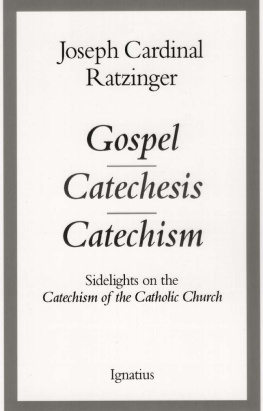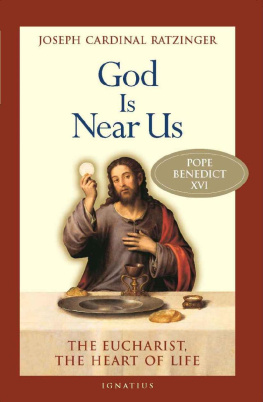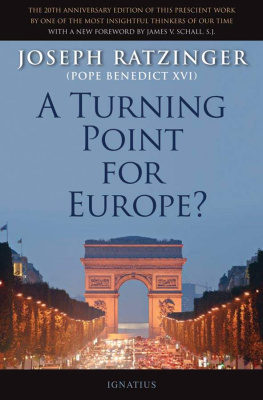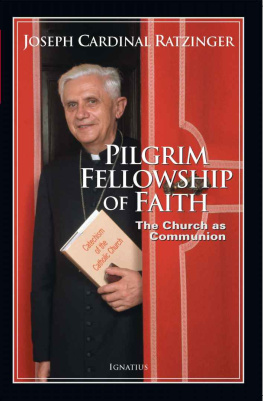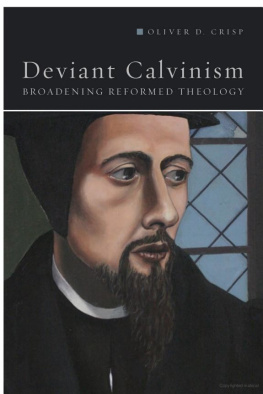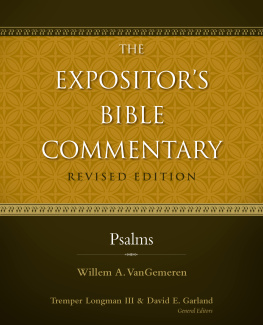The End of Time?
The Provocation of Talking about God
Proceedings of a meeting of Joseph Cardinal Ratzinger, Johann Baptist Metz, Jrgen Moltmann, and Eveline Goodman-Thau in Ahaus
Edited by Tiemo Rainer Peters and Claus Urban
English edition translated and edited by J. Matthew Ashley

Paulist Press
New York/Mahwah, N.J.
Unless otherwise noted, the scripture quotations herein are from the New Revised Standard Version Bible, copyright 1989 by the Division of Christian Education of the National Council of Churches of Christ in the U.S.A. Used by permission.
Cover design by Lynn Else
Title of the original edition: Ende der Zeit? Copyright 1999 by Matthias-Grnewald-Verlag, Mainz, Germany
English translation copyright 2004 by Paulist Press, Inc.
All rights reserved. No part of this book may be reproduced or transmitted in any form or by any means, electronic or mechanical, including photocopying, recording or by any information storage and retrieval system without permission in writing from the publisher.
Library of Congress Cataloging-in-Publication Data
Ende der Zeit. English.
The end of time? : the provocation of talking about God : proceedings of a meeting of Joseph Cardinal Ratzinger, Johann Baptist Metz, Jrgen Moltmann, and Eveline Goodman-Thau in Ahaus / edited by Tiemo Rainer Peters and Claus Urban ; translated and edited by J. Matthew Ashley.
p. cm.
ISBN 0-8091-4170-1 / E-ISBN 978-1-58768-311-4
1. GodCongresses. 2. EschatologyCongresses. 3. TimeReligious aspectsChristianityCongresses. I. Peters, Tiemo Rainer, 1938 II. Urban, Claus, 1943 III. Ashley, James Matthew, 1958 IV. Title.
BT103.E53 2004
230dc22
2004013311
Produced by Paulist Press
997 Macarthur Boulevard
Mahwah, New Jersey 07430
www.paulistpress.com
Contents
North American readers may find it helpful to know a little of the history that lies behind this symposium, particularly concerning the relationship of its two primary participants, Professor Johann Baptist Metz and Cardinal Joseph Ratzinger. He was clearly a rising star in German Catholic theology.
Then Cardinal Ratzinger intervened. A little over a year apart in age, both Bavarians from arch-Catholic villages, Ratzinger and Metz had been colleagues at Mnster before Ratzinger went to Tbingen, and then left academic theology to become Bishop of Regensburg. Metz and Ratzinger had been on good terms; indeed, Ratzinger had helped Metz secure his position in Mnster. Now, as Archbishop of Munich, Ratzinger too was a star in the ascendant in the young papacy of John Paul II. Within two years he would be appointed the prefect of the Congregation for the Defense of the Faith, the position he still held when he came to Ahaus in 1998. Yet here, some two decades earlier, Ratzinger did something that, together with his actions in the German Bishops Conference to remove Hans Kngs missio canonica to teach Catholic theology, was seen by many as a prelude to the policies he would implement in that powerful position. Under a provision of the concordat worked out between the Bavarian government and the Holy See in 1924, the local bishop had the right to veto the top choice for a given appointment to a faculty of Catholic theology. Ratzinger availed himself of this perquisite and prevailed on the Bavarian Minister of Culture to appoint Heinrich Dring instead of Metz.
Ratzingers intervention unleashed a storm of controversy, including a particularly strong, even vitriolic letter of protest from Metzs former teacher and mentor, Karl Rahner.
Two final notes on the translation itself: First, insofar as I believe responsible English theological usage should strive where possible to use inclusive language for human beings and for God, I have tried to do so in what follows, even though the German texts here translated do not follow that usage. Other than that, the only changes I have made were to find English translations of the German texts cited or quoted wherever possible. In general, I have used already existing English translations of quoted works, where I could find them. All biblical quotes are from the New Revised Standard Version. Second, I would like to recognize two of my colleagues who helped me with this translation. Professor Thomas Prgl provided invaluable assistance with a number of translation quandaries, as well as with background information on the German cultural and political scene. For Eveline Goodman-Thaus lecture, Professor Hindy Najman helped me find citations and quotations from the Mishnah, the Talmud, and the Hebrew Bible. My heartfelt thanks to both of them. Of course, the translation is still my own, as is responsibility for any errors in it.
J. Matthew Ashley
South Bend, Indiana
April 2003
Notes
The details of the events surrounding Metzs vetoed appointment to the University of Munich are taken from John Allens lucid account in John L. Allen, Cardinal Ratzinger: The Vaticans Enforcer of the Faith (New York: Continuum, 2000), 12427.
Rahner had selected Metz to edit for republication both of Rahners early foundational works, Spirit in the World and Hearers of the Word. Rahner had also chosen Metz to write pivotal entries (on theology, unbelief, and the world, for instance) in the Lexicon fur Theologie und Kirche, as well as the articles on apologetics and political theology in Sacramentum Mundi. Heinrich Fries himself, for whose chair in Munich Metz was being considered, had commissioned Metz to write entries on freedom, concupiscence, and bodiliness in Handbuch theologischer Grundbegriffe.
He named it thus to distinguish it in particular from the work of Carl Schmitt, a political theorist whose infamous political theology of the 1930s provided a theological justification of the Nazi state. Metzs vigorous attempts to differentiate his approach have never persuaded many of his critics. Indeed, it may very well be this association that lay behind Ratzingers perception in the 1960s of a conflict emerging that could go deep indeed (cited in Moltmanns essay below, p. 54, n. 1).
For the former title: Johann Baptist Metz, Faith in History and Society, 2nd English edition, translated and edited, with an introduction by J. Matthew Ashley (New York: Crossroad, forthcoming).
In a conversation with me in June of 2002, Metz pointed out that there was opposition to his appointment in the Bavarian Ministry of Culture as well as from the episcopal chancellery.
Ich protestiere, Suddeutsche Zeitung, November 19, 1979. Allen gives a partial translation, Cardinal Ratzinger, 125f.
See his rather muted comments in On My Own Behalf, The Emergent Church: The Future of Christianity in a Postbourgeois World, trans. Peter Mann (New York: Crossroad, 1987), 12123.
Signed by over four hundred European theologians, including figures as important as Edward Schillebeeckx, Norbert Greinacher, Bernard Hring, Hans Kung, and Metz himself, the declaration criticized church policies on issues such as the autocratic appointment of bishops, draconian measures against theologians, and the steady creep of claims for magisterial infallibility. It was greeted with anger by Ratzinger. See Allen, Cardinal Ratzinger, 282f.
Hans Kung was particularly incensed.
On October 27, 1998, on the occasion of his seventieth birthday, a group of Johann Baptist Metzs friends and students, along with the Seminar for Fundamental Theology at the University of Mnster and the current events/cultural forum in Ahaus, held a theology meeting at the palace in Ahaus. Although the theme, The End of Time? The Provocation of Talking about God, did not seem to be all that controversial, or promise to be particularly relevant, it brought unaccustomed attention to Ahausalready notorious because of the protests over nuclear waste transport and storage and nuclear power in general.
Next page



